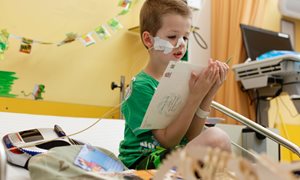In a minority of children with cancer, genetic predisposition plays a decisive role. It is important to identify those patients. For the patient, diagnosis of such a cancer predisposition syndrome may lead to strategies for optimal therapy and surveillance measures for early detection of a second primary cancer. A cancer surveillance program might also be warranted for family members and detection of a predisposing genetic mutation might allow for reproductive counseling and prenatal diagnosis.
When to refer for genetic counselling
This test on this page will determine if your patient has features suggestive of a genetic predisposition for cancer and whether referral to a clinical geneticist is indicated. The questions can be answered by clicking YES or NO. If you have answered YES, you will receive a recommendation to refer your patient to a clinical geneticist. At this point, the test ends for you. If you have answered all questions with NO, then there is no indication for referral of your patient.
Pediatric cancer risk assessment

